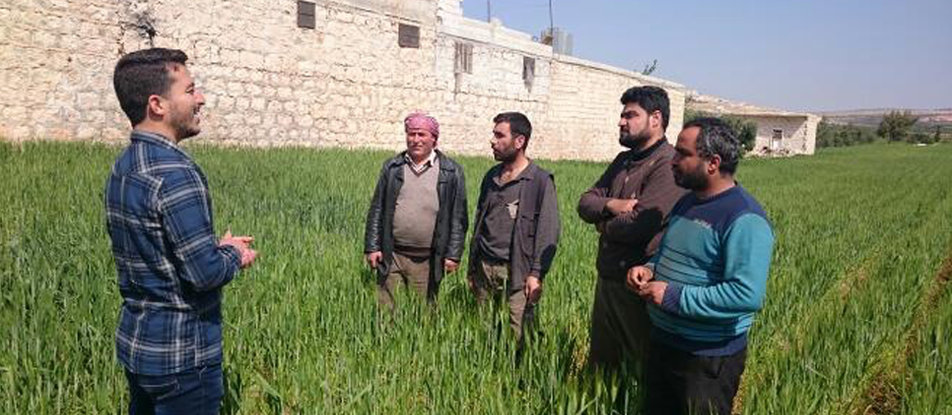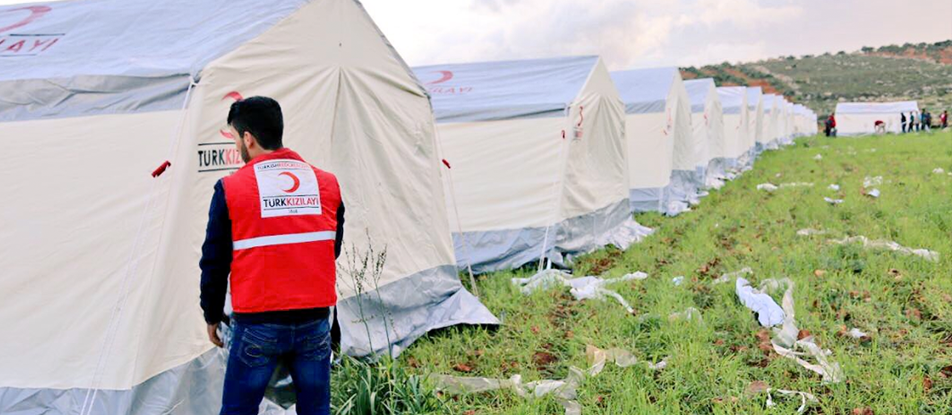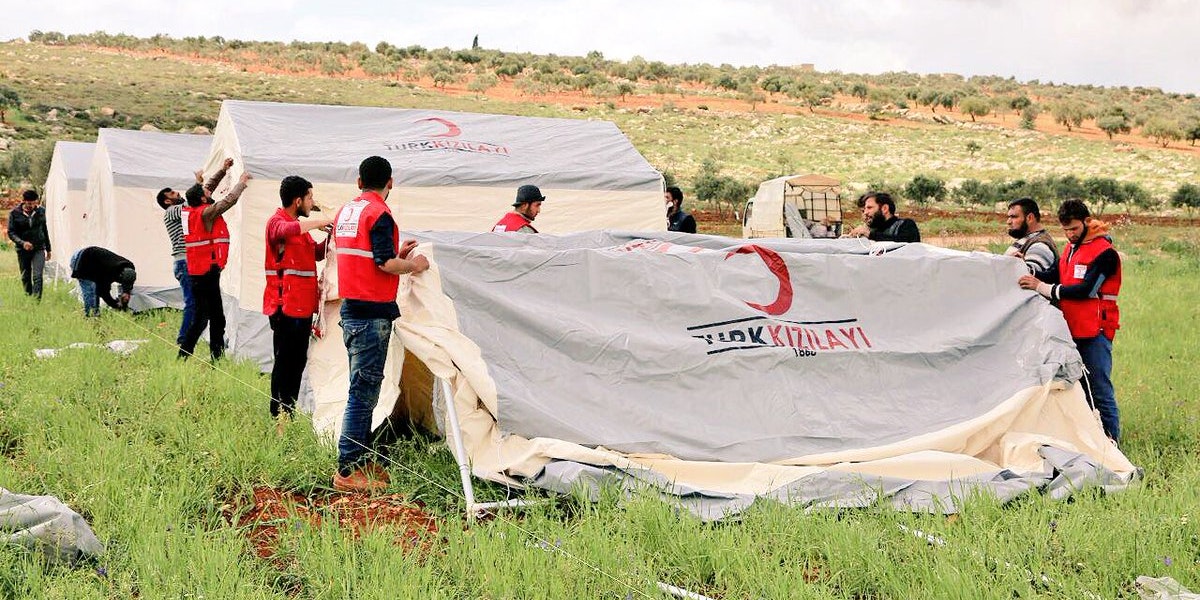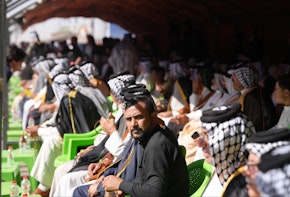International humanitarian organizations providing vital relief inside Syria are now facing a rolling crackdown by the Turkish government, an ongoing campaign of closures and arrests whose ultimate end is uncertain.
Syria’s brutal war has created an incredible humanitarian challenge for the international community, and for neighboring Turkey in particular. Before the war, Turkey had no real experience hosting the sort of international relief NGOs (INGOs) through which large state donors channel their humanitarian crisis response. But—faced with needs beyond its own capacity—Turkey was forced to stretch, elastically, to accommodate the largely autonomous INGOs that served as the conduit for part of a multi-billion-dollar Syria aid effort.
Now the Turkish system seems to be snapping back into place, as Turkey attempts to impose more control on an international relief community that, for its part, venerates principles of neutrality and independence.1
In interviews both in Turkey and conducted remotely, nearly two dozen relief and development workers, diplomats, and others described to me how humanitarians’ ostensibly apolitical relief to needy Syrians has inadvertently become intensely political—part of Turkey’s charged politics and Syria’s multi-sided, internationalized conflict.
Turkey’s INGO crackdown is a new stress test for humanitarianism. In more concrete human terms, though, it means the future of the international relief response in Syria is in question.
Syria’s war and the imposed politicization of Syria relief—relief that interested states or armed actors have allowed only to favored constituencies—has brought into sharp relief the tensions and contradictions inherent to humanitarian work worldwide.
Turkey’s INGO crackdown is a new stress test for humanitarianism. In more concrete human terms, though, it means the future of the international relief response in Syria is in question. Some of Syria’s most vulnerable are at risk.
North Syria’s Cross-Border Relief Effort
Turkish authorities’ February closure of U.S.-based relief INGO Mercy Corps seems to have been the moment simmering tensions between the Turkish state and the international Syria relief sector finally reached a boil.2 Subsequently, employees of Danish INGO DanChurchAid and America’s International Medical Corps (IMC) were detained in March and April, respectively, and four of IMC’s international staff were deported.3 At least three other INGOs have also been banned, and others have reportedly been denied renewed licenses to operate.4
Mercy Corps and IMC have been at the center of the international relief effort to help needy Syrians in Syria’s rebel-held north. International humanitarian aid has mostly run through a handful of large relief INGOs including Mercy Corps, IMC, Save the Children, GOAL, and the International Rescue Committee (IRC). These INGOs have channeled UN and Western donor funding to their implementing staff inside the country and to Syrian and Turkish local NGO partners.
Operating from Turkey, these organizations primarily serve the rebel northwest, centered on Idlib province, and the northern and eastern Aleppo countryside. According to my own estimates using the International Organization for Migration’s Needs and Population Monitoring Data for March 2017, the northwest now holds more than 2.3 million people, including more than 900,000 desperately poor displaced people.5 The northern and eastern Aleppo countryside holds almost half a million people, including roughly 176,000 displaced.6
INGO relief includes material goods like food baskets, tents, and hygiene kits, but also support for intangibles like education and psychosocial assistance for civilians who have been repeatedly shaken by violence.7 In 2016, food aid shipped cross-border from Turkey went to 1.2 million people, and non-food/shelter items to 1.1 million people.8 Before its closure, Mercy Corps had been providing basic humanitarian assistance to between 350,000 and 500,000 people inside Syria from Turkey, as well as 100,000 people in Turkey.9

Most relief INGOs now working inside Syria from Turkey initially set up in 2013. At that time, humanitarians told me, the Turkish government directed these organizations to mostly keep their work low-profile and did not make a priority of organizations’ registrations or employees’ work permits.10 As Syria’s war dragged on, though, what had been a sudden humanitarian emergency turned into an apparently indefinite commitment. INGOs that had been operating halfway within Turkish law expanded and continued operating for their second, third, and fourth year in Turkey. Turkey’s own domestic security also became more precarious, as hostilities reignited with Kurdish insurgents, and jihadists including the Islamic State seized territory south of Turkey’s Syrian border and burrowed into Turkish communities.
Starting in 2014, the Turkish government began to push INGOs to register officially; these organizations secured a mishmash of authorizations, some for five years at a time and some for only one. Then, in 2015, Turkey started demanding that INGO employees get official work permits.11
It was in 2016 that the walls really began to close in on these INGOs. An investigation by the USAID Inspector General uncovered substantial misbehavior in some of the largest INGOs working out of Turkey, including illicit collusion in procurement.12
The Inspector General investigation was “pretty damaging,” said one development worker who, like most others interviewed for this article, would only speak on condition of anonymity. “There wasn’t much confidence these groups knew where their assistance was going. So you could see it from the government of Turkey’s perspective—they said, ‘If you don’t know where this is going, we don’t know where this is going.’”13
Turkish authorities started conducting snap audits, showing up at INGOs’ offices and demanding to interview employees and review documents. The Turks were particularly concerned with informal “hawalah” money transfers, interviewees told me. Syria is totally disconnected from the international banking system, so INGOs have had to send funds to staff and partners via informal networks over which the Turkish government had little real oversight and for which some organizations had sparse documentation.14
Syria’s swirl of armed factions means nearly every section of the country is partially controlled by an organization considered, by one country or another, nefarious and terroristic.
Many of these INGOs, including Mercy Corps, were serving parts of Syria that included areas under the control of Syria’s Democratic Union Party (PYD) and the People’s Protection Units (YPG), its parallel armed organization. The PYD and YPG are extensively linked with the Kurdistan People’s Party (PKK), which has waged a decades-long, off-and-on armed struggle against the Turkish state. Turkey considers the PKK a terrorist organization and a grave national security threat.15

Syria’s swirl of armed factions means nearly every section of the country is partially controlled by an organization considered, by one country or another, nefarious and terroristic. Humanitarians based in Turkey have had little choice but to work around, for example, al-Qaeda-linked jihadists in northwest Syria. Yet Ankara mostly seems to have been alarmed by one “terrorist” organization in particular—the PKK, or in this case its Syrian manifestations.
All this time, Turkey’s regulations for INGOs had been evolving. The country had no prior experience hosting relief INGOs and no ready legal framework to accommodate them, so it jury-rigged the application of existing laws and regulations to cover the incoming organizations.16 But Turkey’s shifting, byzantine regulatory environment and INGOs’ initial go-go urgency in setting up their operations meant that nearly every INGO fell afoul of some regulation, and was thus potentially vulnerable to official reprisal.
“Turkey’s not Burkina Faso,” a humanitarian told me. “It has a large and sophisticated bureaucracy, and it’s in your interest to be in touch with [Turkish authorities], not to have the only time you see them be when you have a problem.”
“And Turkey is an incredibly proud nation,” he added. “They’re extremely sensitive to criticism and to areas they perceive they are being ignored.”17
In February 2017, a number of INGOs suddenly had a problem.
Turkey Cracks Down
Turkish authorities’ abrupt closure of Mercy Corps in February 2017 marked a harder turn in Turkey’s relationship with the Syria-focused humanitarian community. The Turkish government has offered little official rationale for coming down on these INGOs. Mercy Corps spokesperson Amy Fairbairn told me the organization could not “speculate about the reasons for the cancellation of our registration. We remain confident in the impartiality and efficacy of our operations.”18 An informed source in the humanitarian community explained that when the Turkish Ministry of the Interior closed Mercy Corps, it cited an article of Turkey’s associations regulation that allows the ministry to withdraw an organization’s authorization if it “acts against the law or public safety”—a justification seemingly vague enough to be deployed at will.19 Turkish authorities reportedly cited issues with work permits in arresting IMC’s employees, a charge IMC disputes.20
A series of inflammatory columns in Sabah and Yeni Şafak, two Turkish dailies considered close to the Turkish government, have seemingly given some insight into official Turkish thinking. Both have accused various INGOs of coordinating with Western intelligence agencies to direct funds to the PKK inside Syria.21 (Yeni Şafak also layered on several additional wild claims, including organ trafficking and gunrunning.22) Turkish officials have also told local press that NGOs have been closed for “damaging Turkey’s national unity” or on “national security” grounds.23
Humanitarians and development workers who spoke to me for this article were mostly convinced Mercy Corps had been targeted for its assistance to areas under PYD-YPG control, including the cities of Manbij and Kobani.24
Some interviewees speculated to me that the crackdown could be meant to pressure Washington. U.S.-Turkish relations have taken a nosedive over U.S. support for the YPG and Washington’s unwillingness to render a Muslim cleric—outside normal extradition procedure—whom the Turkish government accuses of heading a clandestine terror organization and masterminding a failed coup attempt in Turkey last July. The Turkish government has taken other measures that seem clearly aimed at the United States, including arresting a longtime U.S. consular employee (and Turkish national) over supposed terror links25 and, on April 15, announcing an investigation into seventeen prominent American officials and academics over their alleged involvement in last year’s coup attempt.26
Other countries, including Germany and the Netherlands, became targets of official Turkish anger after refusing to let Turkish politicians hold rallies related to the country’s April referendum.27 They then figured into the Turkish press’s conspiratorial, rabble-rousing INGO coverage.28
“Certain Western countries have been pissing off the Turkish government in different ways,” one Turkey-based Western diplomat told me. “[The Turks] have—well, I won’t say carrots—they have sticks they use in different ways, some public, some private.”29
But while there are apparently political motives at work, the INGO crackdown also seems as if it may be an overdeveloped Turkish bureaucracy’s delayed reaction against alien organizations it doesn’t fully understand or trust.

“I’m sure [these INGOs] did it for the right reasons, in terms of the humanitarian imperative,” a humanitarian told me about INGOs’ sometimes fast-and-loose approach to Turkish law. “But what it has generated within the Turkish bureaucracy is a sense that NGOs aren’t being upfront, that they’re not playing with open cards. And it plays into this suspicion of civil society.”30
“For INGOs, it’s difficult and sensitive to work through Turkey,” Mehmet Güllüoglu, Director-General of the semi-governmental Turkish Red Crescent, told me in the Red Crescent’s Ankara headquarters. “But they should work, they should have a position. Because there are millions of people inside Syria in a needy situation. But they should be much more sensitive. They should understand Turkey, and they should express themselves very well, without any gray area. They should be very transparent.”31
Interviewees told me the Turkish government, as they understood it, wanted to reshape the Syrian humanitarian response to lean more heavily on local NGOs, both Turkish and Syrian, over which the Turkish government has more complete oversight. They also thought Turkey was attempting to position its semi-governmental civil defense organization the Disaster and Emergency Management Presidency (AFAD) to play a more hands-on coordinating role.32
Representatives for the Turkish government did not respond to requests for comment. I corresponded with AFAD officials, but they did not respond to a set of written questions.
A number of INGOs still have to apply to renew their one-year registration, or have already seen their registration lapse. Yet so far only one Western INGO has had its registration renewed since the July 15 coup attempt,33 in April of this year. Even without active revocations or expulsions, the gradual expiration of these INGOs’ registrations, left alone, could rapidly thin their number.
INGOs and Western officials responsible for overseeing relief and development programs have been sharply divided over how to push back, especially given the fear that the Turkish government might react swiftly and negatively to Westerners attempting to dictate terms.
“We were asking, should we be quiet?” one diplomat told me after the Mercy Corps closure. “If we make a stink about this, will it affect the ability of other aid groups to be effective?”34
Syria Relief in Jeopardy
Further INGO closures could pose a systemic threat to the relief effort in north Syria.
For INGOs, north Syria is already an extremely difficult work environment. They have limited cross-border access—Turkey allows only a handful of staff to enter Syria monthly—which reduces their visibility on their own operations and makes it difficult to supervise or train staff. Inside Syria, they also need to worry about pressures from armed groups (including designated terrorist organizations) to divert relief, as well as the physical safety of their staff and partners. If these organizations lost their foothold in south Turkey, they could arrange to coordinate remotely with partners inside Syria from bases in Lebanon, Jordan, or Iraq. But that would take time they don’t have, and their already difficult job would become even harder.35
Interviewees told me after Mercy Corps’ closure that remaining relief organizations could likely fill the gap, although they emphasized that INGOs each have relevant specializations and aren’t somehow interchangeable or fully substitutable.36 The Turkish government seemed not to understand that, a humanitarian told me. “For them, NGOs are fairly generic. They just freight commodities from A to Z.”37
But more sweeping closures could cause a major disruption in relief provision to north Syria, in part because of how it would affect the flow of donor money. These INGOS—which can satisfy Western donors’ reporting and monitoring standards in a way most local NGOs cannot—are a critical conduit for funds from donors including USAID, Britain’s Department for International Development (DfID), and the European Union. Those funds in turn sustain a host of local NGOs. Inside rebel-held Syria, INGOs and partnered local NGOs fuel much of the local economy, including serving as one of the most important sources of legitimate, non-militant employment.38
“Of course, as local NGOs, we’re afraid of [more INGOs closing],” said an officer with a local Syrian relief NGO. “The first thing affected will be the community, which we care about a lot. Those big NGOs are the main channels to deliver and administer those grants, and to train the staff of local NGOs so they can bring these projects to recipients as they ought to be done. So we’re definitely afraid. Mercy Corps had a lot of excellent work in our areas, in west Aleppo.”39
“It would leave a big gap,” said his colleague.40
And Western donor governments used to relying on INGOs are resistant to directing funds through the Turkish government and related institutions. “[The Turks are] asking for help, but in a way our government doesn’t provide,” a diplomat told me. “They want a check written to the Turkish government. We don’t write checks to governments of developed countries.”41
Interviewees disagreed over whether Turkey could somehow shoulder the relief burden itself.
“Of course not,” one diplomat told me. Turkey has so far mostly excluded INGOs from the eastern Aleppo countryside, where Turkey’s Operation Euphrates Shield last year drove the Islamic State back from Turkey’s border and where Turkey has since actively managed civil life and governance. Turkey’s solo state-building effort in east Aleppo recalls its response to the initial wave of Syrian refugees, in which it set up expensive, model camps—deluxe trailers, complete with flatscreen TVs—that ultimately proved unsustainable as millions more Syrian refugees poured in. “We’re still waiting for them to ask for help in Jarablous and A’zaz,” said the diplomat, naming two north Aleppo towns. “But they just say, ‘Back off, we’ve got this.’ It reminds me of the beginning of the conflict. They said, ‘We’re generous hosts, we’ve got this.’ Then in a few years, they were begging for help.”42
“I don’t want to criticize them so much,” said the diplomat. “They’re so much better than everyone else in the region in terms of their treatment of refugees, and I sympathize.”43
Others were less sure that Turkey was unable to handle it. AFAD has been building up logistical hubs near the border, I was told, and it recently received a major influx of Saudi and Qatari money.44
But overall, people with whom I spoke were pessimistic. “I don’t see something in place to replace assistance to these vulnerable populations,” a development worker told me. “It’s not like it’s being taken up by AFAD—when it ends, it ends.”45
If more INGOs are shaken out, Idlib and surrounding parts of Syria’s northwest seem likely to have the roughest time of it. It is the Idlib-centered northwest that relies most heavily on INGO support. The Assad regime has already turned the largely jihadist-controlled Idlib into a dumping ground for displaced people and, maybe imminently, a massive killing field. All Idlib’s residents and displaced people need now is a sudden break in life-sustaining humanitarian relief. The result could be major new refugee flows into Turkey, exactly what Turkey would like to avoid.
The Turkish Red Crescent’s Mehmet Güllüoglu stressed the humanitarian imperative of helping these vulnerable people, whatever the obstacles. “As much as the Turkish government makes barriers, let’s say, or as much as opposition groups make barriers for them, we should do something!” he said to me. “Because the babies in there, or the elderly people in there, this isn’t their fault. Or the pregnant women in there. The bureaucracy, or these issues with papers and documents aren’t their fault. I think we should find some way, they should find some way to reach those people.”46
Yet those people, through no fault of their own, are in danger. Humanitarians are supposed to be above, or apart from, politics. But it’s not as if they’re operating in a vacuum—they’re operating in Turkey, which is a real place with real problems.
Principled humanitarianism has arguably been broken in Syria since 2012, when the Assad regime obliged relief organizations to choose between working in areas of its control from Damascus or serving insurgent-held areas from Syria’s neighbors. Organizations split in both directions, debatably choosing sides in the process.
Now Turkey’s security breakdown and hyper tense politics may be combining to make it impossible to render neutral, independent humanitarian support to needy people in north Syria.
The result, in the abstract, is another blow to the global humanitarian model. In real practice—on the ground inside Syria—it could be a man made crisis.
Cover Photo: Türk Kızılayı, Twitter
Notes
- The four core humanitarian principles—as endorsed in UN General Assembly Resolutions 46/182 and 58/114—are humanity, neutrality, impartiality, and independence.
- Turkish authorities notified Mercy Corps on February 21 that its authorization had been revoked. Mercy Corps announced the closure publicly on March 7, saying it would totally shut down its operations in Turkey after attempts to appeal to the Turkish government were unsuccessful. See “Mercy Corps Closes Operations in Turkey,” March 7, 2017, https://www.mercycorps.org/press-room/releases/mercy-corps-closes-operations-turkey.
- Karen DeYoung and Kareem Fahim, “Turkey deports foreigners working with Syrian refugees,” Washington Post, April 26, 2017, https://www.washingtonpost.com/world/turkey-arrests-more-than-1000-suspected-followers-of-us-based-cleric/2017/04/26/dfa33540-2a6c-11e7-86b7-5d31b5fdc114_story.html?utm_term=.b57125ccc1c4 ; Diego Cupolo, “Turkey steps up crackdown on humanitarian aid groups,” IRIN, 27 April 2017, https://www.irinnews.org/news/2017/04/27/turkey-steps-crackdown-humanitarian-aid-groups.
- Sevil Erkuş, “Foreign humanitarian organizations in Turkey under scrutiny,” Hürriyet Daily News, April 13, 2017, http://www.hurriyetdailynews.com/foreign-humanitarian-organizations-in-turkey-under-scrutiny-.aspx?pageID=238&nID=111957&NewsCatID=339 .
- Author’s estimate using the International Organization for Migration’s Needs and Population Monitoring Data for March 2017. For details on methodology, see Sam Heller (@abujamajem), Twitter, 20 April 2017, https://twitter.com/AbuJamajem/status/855009979375509508 .
- Author’s estimate using the International Organization for Migration’s Needs and Population Monitoring Data for March 2017. For details on methodology, see Sam Heller (@abujamajem), Twitter, 29 April 2017, https://twitter.com/AbuJamajem/status/858352120826867712.
- For a breakdown of cross-border assistance from Turkey, see “Turkey | Syria: Cross-Border Humanitarian Reach and Activities from Turkey (December 2016) [EN/AR],” UN Office for the Coordination of Humanitarian Affairs, February 20, 2017, http://reliefweb.int/report/syrian-arab-republic/turkey-syria-cross-border-humanitarian-reach-and-activities-turkey-1 .
- “Turkey | Syria: Humanitarian Dashboard – Cross Border Response Jan – Dec 2016 (Issued on 30 Mar 2017) [EN/AR],” UN Office for the Coordination of Humanitarian Affairs, 30 March 2017, http://reliefweb.int/report/syrian-arab-republic/turkey-syria-humanitarian-dashboard-cross-border-response-jan-dec-2016 .
- Amy Fairbairn, Mercy Corps, interview with the author, phone, March 2017.
- Humanitarian sources, interviews with the author, Turkey and remotely by phone, March 2017.
- Humanitarian sources, interviews with the author, Turkey and remotely by phone, March 2017.
- Ellen Wulfhorst, “U.S. probes reports of fraud in obtaining aid for Syria,” Reuters, May 11, 2016, http://www.reuters.com/article/us-usa-aid-investigation-idUSKCN0Y22AU .
- Development worker, interview with the author, phone, March 2017.
- Humanitarian sources, interviews with the author, Turkey and remotely by phone, March 2017.
- Sam Heller, “Turkey’s ‘Turkey First’ Syria Policy,” The Century Foundation, April 12, 2017, https://tcf.org/content/report/turkeys-turkey-first-syria-policy/ .
- Humanitarian sources, interviews with the author, Turkey, March 2017.
- Humanitarian source, interview with the author, phone, March 2017.
- Amy Fairbairn, Mercy Corps, e-mail to the author, March 2017.
- Humanitarian source, interview with the author, Turkey, March 2017.
- Diego Cupolo, “Turkey steps up crackdown on humanitarian aid groups.”
- Ersin Ramoğlu, “Hatay’daki nifak merkezleri kapanmalı,” Sabah, March 20, 2017, http://www.sabah.com.tr/bolgeler/yazarlar/ramoglu/2017/03/20/hataydaki-nifak-merkezleri-kapanmali .
- Aybike Eroğlu, “Artık yasak,” Yeni Şafak, March 9, 2017, http://www.yenisafak.com/gundem/artik-yasak-2625447 .
- “Başbakan Yardımcısı Veysi Kaynak: Yabancı vakıflar inceleniyor,” Posta, April 13, 2017, http://www.posta.com.tr/basbakan-yardimcisi-veysi-kaynak-yabanci-vakiflar-inceleniyor-haberi-1286270 ; Sevil Erkuş, “Foreign humanitarian organizations in Turkey under scrutiny,” Hürriyet Daily News, April 13, 2017, http://www.hurriyetdailynews.com/foreign-humanitarian-organizations-in-turkey-under-scrutiny-.aspx?pageID=238&nID=111957&NewsCatID=339 .
- Humanitarian sources, interviews with the author, Turkey and remotely by phone, March-April 2017.
- “US consulate employee in Turkey’s Adana arrested over PKK links,” Hürriyet Daily News, March 7, 2017, http://www.hurriyetdailynews.com/us-consulate-employee-in-turkeys-adana-arrested-over-pkk-links.aspx?PageID=238&NID=110524&NewsCatID=509.
- Patrick Kingsley, “Turkey Investigating 17, Some Americans, Accused in Failed Coup,” New York Times, April 15, 2017, https://www.nytimes.com/2017/04/15/world/europe/turkey-failed-coup-investigation-americans.html?smid=tw-nytimesworld&smtyp=cur .
- Patrick Kingsley and Alissa J. Rubin, “Turkey’s Relations With Europe Sink Amid Quarrel With Netherlands,” New York Times, March 12, 2017, https://www.nytimes.com/2017/03/12/world/europe/netherlands-recep-tayyip-erdogan-turkey.html .
- For example, see Ersin Ramoğlu, “Hatay’daki nifak merkezleri kapanmalı,” Sabah.
- Western diplomat, interview with the author, Turkey, March 2017.
- Humanitarian source, interview with the author, phone, March 2017.
- Mehmet Güllüoglu, Turkish Red Crescent, interview with the author, Ankara, Turkey, March 2017.
- Humanitarian sources, interviews with the author, Turkey and remotely by phone, March 2017.
- Christiaan Triebert, “‘We’ve shot four people. Everything’s fine.’ The Turkish Coup through the Eyes of its Plotters,” Bellingcat, July 24, 2016, https://www.bellingcat.com/news/mena/2016/07/24/the-turkey-coup-through-the-eyes-of-its-plotters/ .
- Western diplomat, interview with the author, Turkey, March 2017.
- Humanitarian sources, interviews with the author, Turkey and remotely by phone, March 2017.
- Humanitarian sources, interviews with the author, Turkey and remotely by phone, March 2017.
- Humanitarian source, interview with the author, phone, March 2017.
- Humanitarian sources, interviews with the author, Turkey, March 2017.
- Syrian humanitarian, interview with the author, Turkey, March 2017.
- Syrian humanitarian, interview with the author, Turkey, March 2017.
- Western diplomat, interview with the author, Turkey, March 2017.
- Western diplomat, interview with the author, Turkey, March 2017.
- Ibid. Turkey hosts nearly three million Syrian refugees. “Syria Regional Refugee Response,” UN High Commissioner for Refugees, accessed 17 April 2017, http://data.unhcr.org/syrianrefugees/regional.php .
- Interview with the author, March 2017.
- Development worker, interview with the author, phone, March 2017.
- Mehmet Güllüoglu, Turkish Red Crescent, interview with the author.










